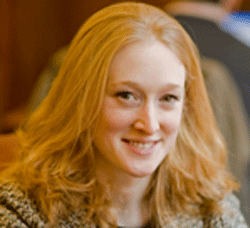Helping Educators Help Themselves
Emily Zemke, the coordinator of TC’s year-old Office of School and Community Partnerships (OSCP), has always been drawn to education.
As a journalist in
So three years later, she created her own job. She started XCM (Extra-Curricular Magazine), a publication for teachers in
Still, Zemke was troubled by the difficulty of fairly representing teachers’ interests and needs through the commercial press. So in January 2004, she took the next logical step and embarked on a Ph.D. at
A visiting scholar position brought her to Teachers College in 2006. Here she completed her doctorate and took up her current position, where, as right hand to Associate Vice President Nancy Streim, she is thrilled to be in the epicenter of the burgeoning educational movement of university-assisted education.
“It is really exciting to be involved, from the beginning, in this extremely worthwhile agenda,” Zemke says.
Zemke has helped OSCP win $8.5 million in grants that will be used in partnership programs with a group of public schools in
She also does research on partner schools, manages communication between the schools and TC and recently organized “University-Assisted Public Schools as a Model for P–16 Education in
In other words, she’s the go-to person for
For example, 10 seventh graders from
“People can call in with any request,” Zemke says, adding that teachers contact her about college visits, student volunteers and recruitment, as well as access to professional development and other resources and opportunities.
As TC’s partnerships with
“There is such huge potential in a neighborhood like
To effectively direct and channel TC resources into schools, OSCP is finalizing a contract with the New York City Department of Education to establish a long-term School Partnership Network with 10 to 12 public elementary, middle and high schools that serve students most at risk for dropping out or under-achieving. TC will direct a wide array of existing and new resources to the Network schools, including professional development opportunities, targeted curriculum enhancements, student teacher placements and parent/family engagement activities.
Two recently awarded grants—a $5 million grant from the GE Foundation and a $3 million grant from the state-funded
Zemke says the purpose is to “raise student achievement in a sustainable way.” With more resources, students in partner schools will be better able to navigate the school pipeline into college. But there is a broader purpose, too: TC will create models that can be replicated, a benefit to struggling public schools everywhere.
“We feel a responsibility to help and support the children of this community by helping educators help themselves,” Zemke says. “We are stakeholders in their future.”
Published Tuesday, Nov. 11, 2008

